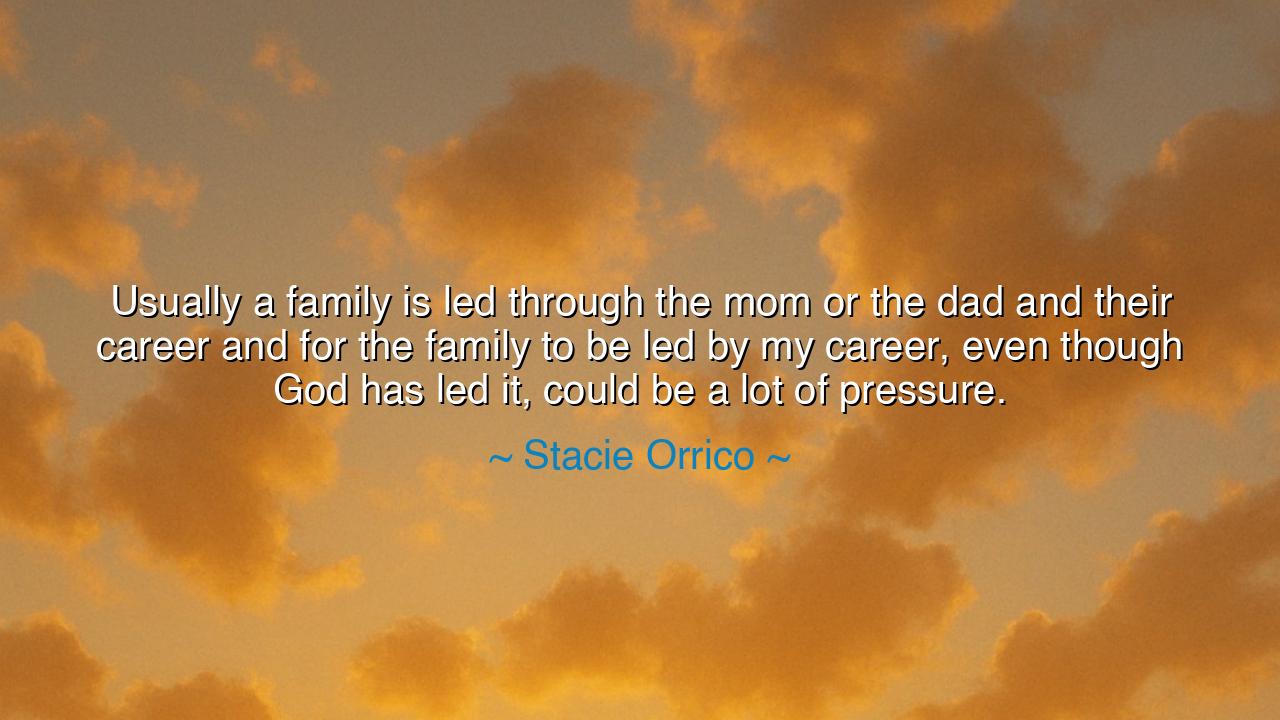
Usually a family is led through the mom or the dad and their
Usually a family is led through the mom or the dad and their career and for the family to be led by my career, even though God has led it, could be a lot of pressure.






Hearken, children of reflection, to the words of Stacie Orrico, who confesses: "Usually a family is led through the mom or the dad and their career and for the family to be led by my career, even though God has led it, could be a lot of pressure." In these words lies a meditation upon duty, divine guidance, and the delicate balance between personal ambition and the welfare of one’s household. Since the days of the ancients, the philosophers have taught that leadership within the family is both a privilege and a burden, requiring wisdom, humility, and moral fortitude.
The ancients recognized that family is the first school of responsibility and virtue. Aristotle wrote that the household is a microcosm of the polis, where leadership shapes character and harmony. Orrico’s reflection that families are typically guided by the mom or dad underscores this enduring principle: the head of the household bears the weight of moral, financial, and emotional guidance. For a child to see a parent’s career become the guiding force of family life introduces a reversal of norms, one that carries both blessing and pressure.
Consider the story of Marcus Aurelius, who, as a young heir, assumed responsibilities that shaped both his household and the Roman Empire. Though not the primary head of his family initially, the weight of expectation from both his lineage and public office taught him resilience, discipline, and the exercise of measured judgment. Orrico’s words reflect a similar tension: to have a career influence the family’s path, even under divine guidance, introduces expectations that demand courage and balance.
The quote also illuminates the interplay of personal vocation and family dynamics. Orrico acknowledges that her career is not merely a personal pursuit but one that impacts the broader household, requiring attention to both duty and relationships. Ancient sages recognized the challenges of such duality: leaders must harmonize personal calling with the welfare of those entrusted to their care, lest ambition overshadow responsibility or virtue.
Furthermore, Orrico invokes the role of God as guide, reminding us that leadership and influence are ultimately held accountable to higher principles. The ancients often spoke of divine oversight or the moral order as a balance to human ambition, teaching that power and guidance should be exercised with humility and reverence. For Orrico, the pressure of guiding a family through career is tempered by faith, acknowledging that her influence is part of a larger design beyond herself.
From this reflection emerges a timeless lesson: leadership, whether in family, society, or vocation, carries inherent pressure, requiring moral clarity, self-awareness, and humility. The measure of influence is not only the authority one wields but the care with which one balances personal ambition with the needs and well-being of others. Orrico teaches that even blessings, when intertwined with responsibility, demand wisdom and discernment.
Practical actions follow naturally. Reflect upon the responsibilities your roles impose on others, especially within your family. Seek guidance through reflection, faith, or mentorship when bearing weighty duties. Strive to harmonize personal ambition with the care, guidance, and nurture of those who depend upon you. Embrace the pressure of leadership not as a burden alone, but as an opportunity for growth and virtue.
Remember, children of the ages, that leadership is both gift and responsibility. Stacie Orrico’s words illuminate the eternal truth that to guide a family through personal vocation is a path requiring courage, balance, and reverence. By aligning ambition with wisdom, nurturing with purpose, and faith with action, one can navigate the delicate currents of influence and duty, ensuring that both family and self flourish under the guidance of discernment and grace.






AAdministratorAdministrator
Welcome, honored guests. Please leave a comment, we will respond soon